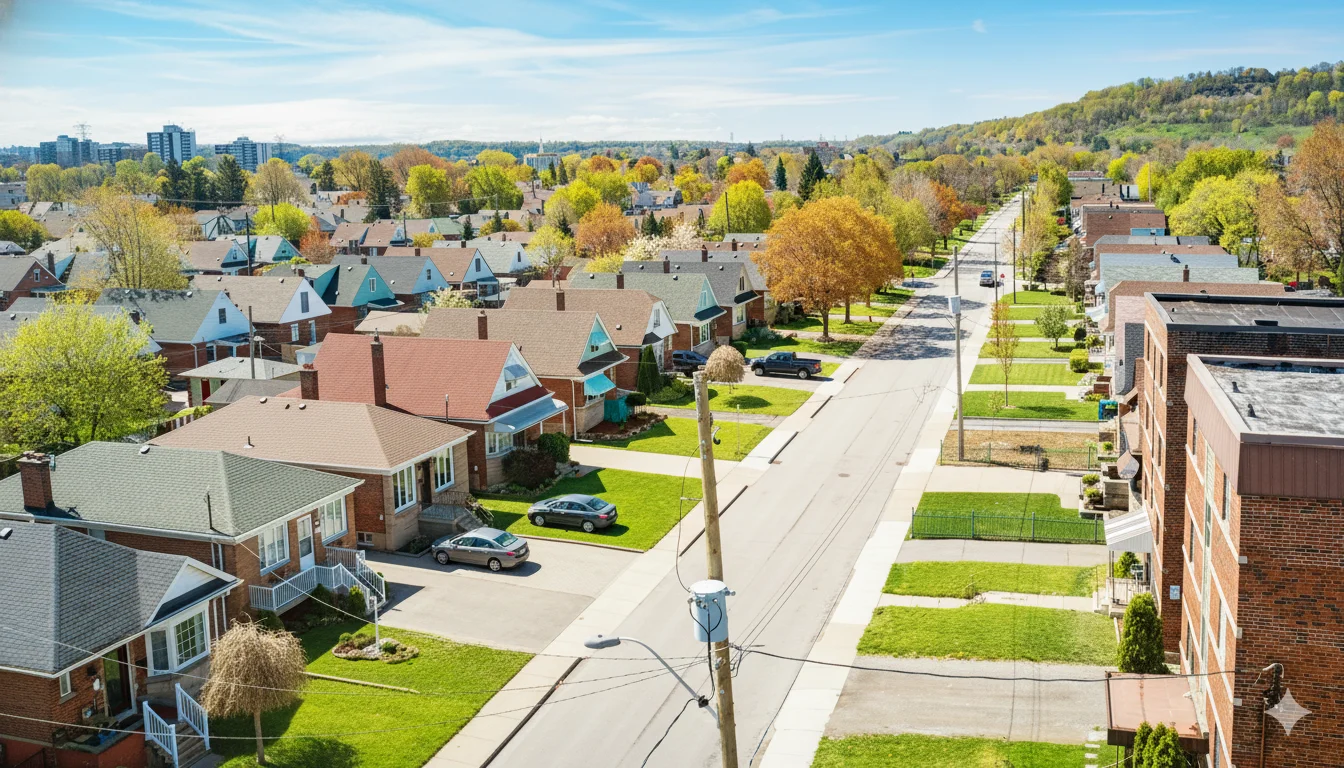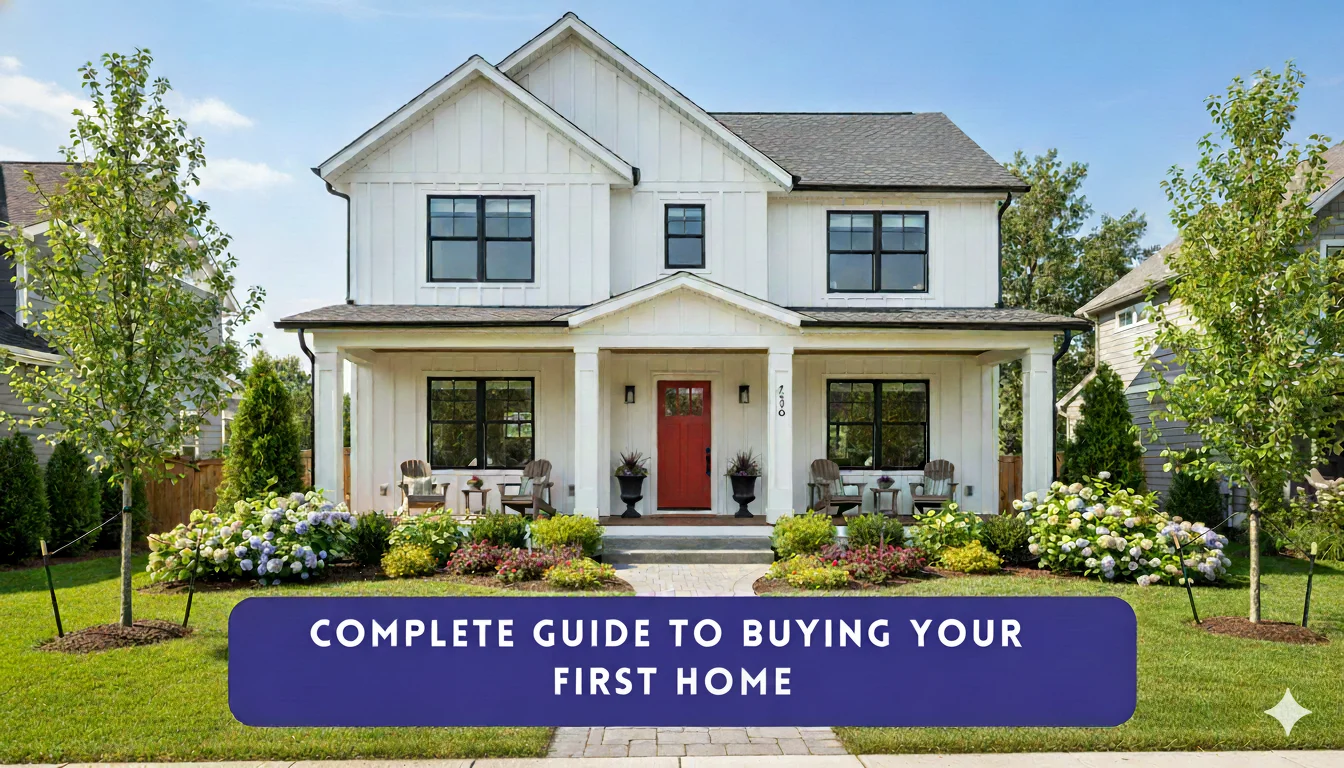Buying your first home is one of the biggest moments in your life. It’s exciting, a little scary, and full of decisions that can shape your future. I still remember helping my first client close on their home; the mix of pride, relief, and “did we really just do that?” on their face said it all. If you’re dreaming of owning your first place but feel unsure where to start, you’re in the right spot. I’ll walk you through each step so you can feel confident, informed, and ready.
First-Time Homebuyer: What Does It Mean?
A first-time homebuyer is someone purchasing a home for the very first time, or someone who hasn’t owned one in the past few years. Being a first-time buyer often means you can qualify for special programs, grants, or low down payment loans that make the process easier. It’s not just about buying a house; it’s about learning how to build stability and equity through your first real investment.
1. Are You Ready to Buy a Home? Here’s How to Know
Check Your Finances Honestly
Before you start scrolling through listings, you’ve got to take a hard, honest look at your finances. Can you cover a down payment, plus closing costs? Do you have enough saved for unexpected expenses like home repairs or moving? Lenders will look at your credit score, debt-to-income ratio, and overall financial habits, so it’s smart to review those before they do.
If you’re not sure where to begin, try tracking every dollar you spend for a month. This alone can be eye-opening. It helps you see what’s left after bills, how much you can save, and where you might trim back to boost your monthly affordability.
Understand What a Mortgage Really Means
A mortgage isn’t just a payment; it’s a long-term promise. Most people focus only on the loan, but it’s also about property taxes, homeowners’ insurance, possibly HOA fees, and maintenance. A common rule to follow is the 28/36 rule: keep your housing costs under 28% of your income and total debt under 36%.
Knowing this helps you avoid buying “too much house” and getting overwhelmed later.
Think About Your Lifestyle and Future
Are you staying put for a few years? Planning major life changes like a job switch or starting a family? Buying a home ties you to a location and a routine, so it’s best to feel stable before diving in. Renting offers flexibility, and buying is more about planting roots.
My Story: The Time I Thought I Was Ready but Wasn’t
Years ago, before I became an agent, I almost bought a condo because I “felt” ready. The kitchen had granite, the building had a gym, and I had just gotten a raise. But my credit wasn’t great, I didn’t have money set aside for repairs, and I had no idea what closing costs were. I got pre-approved, sure, but I didn’t understand the long-term financial responsibility. I’m glad I waited. When I finally bought, I had more savings, better credit, and peace of mind. I bring that lesson into every conversation with my first-time buyer clients.
Your Readiness Is More Than Just Money
Being ready means more than having cash. It means understanding what comes with homeownership, responsibilities, stability, and a big shift in how you plan your future. If that sounds right for you, you’re already ahead of the game.
2. Understanding What You Can Afford
Start with a Realistic View of Your Finances
Before you fall in love with any home, it’s important to know what your budget truly allows. The worst mistake first-time buyers make is focusing only on the listing price. But buying a home includes far more than that. There’s your mortgage payment, of course, but also things like property taxes, homeowners’ insurance, and ongoing maintenance. If the home is in a managed community, there might even be HOA fees to think about.
To get started, look at your income after taxes. From there, subtract your monthly expenses, rent, loans, car payments, food, subscriptions, childcare, everything. What you have left is what might go toward a mortgage. But you can’t throw all of that at a house payment. Lenders use a simple idea called the debt-to-income ratio, or DTI. Most want to see your total debts (including the future mortgage) under about 36% of your monthly income.
Understanding the 28/36 Rule
One easy way to check your affordability is the 28/36 rule. It says your mortgage, taxes, and insurance shouldn’t be more than 28% of your gross income, and your total debt shouldn’t pass 36%. So if you make $5,000 a month, try to keep your monthly housing costs under $1,400 and total debts (credit cards, car loans, student loans) under $1,800. This helps you avoid getting in over your head.
It’s also smart to set aside a small budget cushion. After all, homes come with surprises. One month, it’s a leaky roof. Next, it’s a broken water heater. If you’ve used every dollar on your mortgage, those surprises hit hard. So make sure you leave room for real life.
Down Payment: How Much Do You Really Need?
You may have heard you need 20% down to buy a home. That’s not true anymore. Today, many first-time buyers get started with as little as 3% down. Some government-backed loans even let you buy with 0% down, though they have special rules. But there’s a trade-off. If you put down less than 20%, you’ll usually pay something called private mortgage insurance (PMI). It adds a little to your monthly bill, but it lets you buy sooner.
So the real question is: Do you want to buy now with a smaller down payment and accept PMI, or wait longer to save more? There’s no perfect answer; it depends on your goals and timeline. But either way, it’s good to know the options exist.
Getting Pre-Approved: Your True Buying Power
Once you’ve looked at your own numbers, talk to a lender. A pre-approval is more than a guess; it’s a detailed letter that shows exactly how much a bank is willing to lend you. This number is based on your credit score, income, assets, and debts. It helps you shop with confidence, knowing you’re looking at homes you can actually afford.
But here’s a little tip: just because a lender approves you for a certain amount doesn’t mean you should spend it all. Always ask yourself, “Can I still live comfortably if I take this on?” Think about your hobbies, plans, or emergencies. Will you still be able to travel? Save for retirement? Fix the furnace if it breaks?
Think Beyond the Numbers
Affordability isn’t just about math. It’s about peace of mind. I’ve seen buyers stretch their budget to get the perfect house, only to stress every month over the bills. And I’ve seen buyers pick homes well below their limit and enjoy financial freedom and flexibility. You want to buy a house that fits your life, not one that controls it. According to a working paper by the Federal Housing Finance Agency (FHFA), sustaining homeownership among first-time buyers over time is more challenging than often assumed.
If you take the time to look at the full picture, not just the price tag, you’ll walk into this process more prepared, less anxious, and ready to make a smart move.
3. How First-Time Buyer Programs Can Save You Thousands
What Are First-Time Homebuyer Programs?
These are special programs and financial tools designed to help people who are buying a home for the first time. They often include low down payments, reduced interest rates, and even grants you don’t have to repay. These options are meant to make buying a home easier and more affordable, especially if you’re on a tight budget or still building your credit.
Common Benefits You Might Qualify For
Many of these programs are backed by state or national groups, lenders, or local nonprofits. Depending on where you live and your financial situation, you may qualify for one or more of the following:
- Down Payment Assistance – Cash help to cover your down payment
- Closing Cost Help – Money to help pay lender fees, taxes, or title insurance
- Low or No Down Payment Loans – Like FHA, USDA, or VA loans
- Grants for First-Time Buyers – No repayment required if you stay in the home long enough
- Deferred Payment Loans – Payments are delayed until you sell, refinance, or move out
Loan Program Options at a Glance
| Program Type | Down Payment | Credit Score Needed | Key Benefit |
| FHA Loan | As low as 3.5% | 580+ | Flexible credit, low down payment |
| VA Loan | 0% | 620+ | For the military, no PMI |
| USDA Loan | 0% | 640+ | Rural homes, income limits apply |
| Conventional 97 | 3% | 620+ | Low down payment, private lender |
Note: Requirements can vary by lender or region.
How to Find Programs Near You
Start by checking with your state housing agency; most have a first-time buyer section on their website. You can also ask a lender who works with these programs or speak to a real estate agent familiar with buyer support options. In many areas, these programs are combined with homebuyer education courses that teach you about the process step-by-step.
Final Tip
If you’re not using these programs, you’re probably leaving money on the table. Many of my first-time clients are surprised to find out they qualify, and that extra help can mean the difference between buying now or waiting another year.
4. Finding the Best Neighborhoods for First-Time Buyers
What to Look for in a Neighborhood

When you’re buying your first home, it’s easy to focus only on the house. But where the house is matters just as much, sometimes more. The right neighborhood can make your day-to-day life easier, more enjoyable, and even save you money over time. Here are a few key things to think about:
- Commute Time – How far is work, school, or your usual grocery run?
- Safety – What’s the crime rate like? Is it well-lit at night?
- Walkability – Can you walk to parks, shops, or coffee spots?
- Noise Level – Is it quiet at night? Or close to highways and train tracks?
- Community Vibe – Families, young professionals, retirees who live there?
Why Schools Matter, Even If You Don’t Have Kids
Even if you’re not a parent, living near a good school can help your home’s resale value grow faster. Buyers often pay more to be near highly rated schools. So if you’re thinking long-term, school zones can affect your future profit, not just your current lifestyle.
Check the Local Amenities
Think about the places you go regularly: grocery stores, gyms, restaurants, libraries, and parks. A great home in the middle of nowhere might not feel so great when you’re driving 20 minutes just to grab milk. Look for areas with:
- Grocery stores within 10 minutes
- Access to public transportation or major roads
- Nearby parks or green spaces for relaxing or walking pets
- Local shops, restaurants, or coffee spots that make the area feel alive
Ask Around and Visit at Different Times
Don’t rely only on what a listing says. Visit the neighborhood on a weekday, then again on a weekend. Drive by in the morning and at night. Talk to neighbors if you can. These real-world impressions often reveal more than any online review.
Budget Plays a Role Too
The truth is, some areas are more affordable than others. As a first-time buyer, balance what you want with what fits your budget. Sometimes, a nearby neighborhood can offer similar perks with a lower price tag. You might even find a “hidden gem”, a place on the rise before prices spike.
Choosing your first neighborhood is personal. It’s not just where you live, it’s where your life happens.
5. Building Your Real Estate Dream Team
Why Getting Pre-Approved Should Be First
Before you call a real estate agent or visit open houses, the smartest move is to get pre-approved for a mortgage. This step tells you how much a lender is willing to loan you and shows sellers you’re serious. A pre-approval letter carries more weight than just a quick online calculator; it’s based on your actual income, credit score, and debt. Having this ready upfront also helps you act fast when you find the home you love.
The Role of a Real Estate Agent Who Understands First-Time Buyers
Not all agents are the same, especially when it comes to working with first-time buyers. You want someone who doesn’t just open doors but explains each step clearly, looks out for your interests, and helps you avoid common mistakes. An agent who regularly helps first-time clients knows how to keep the process smooth, how to spot red flags, and how to help you stay confident when the choices feel overwhelming. From writing offers to understanding contracts, their guidance makes all the difference.
Why Local Experience Matters
An agent with local knowledge can tell you things that aren’t on the listing. They know which streets stay quiet, where the best coffee shops are, and which neighborhoods are up-and-coming. They can help you time your offer in a competitive market, point out homes that are fairly priced, and even connect you with trusted lenders, inspectors, or attorneys who’ve helped past clients. That network becomes your network, and that’s powerful.
Home Inspectors Are Your Hidden Heroes
Once your offer is accepted, you’ll need a home inspection. This isn’t just a formality; it’s your chance to find out what’s hiding behind the walls. A good inspector will check the roof, plumbing, electrical system, foundation, and more. Their report helps you decide whether to move forward, ask for repairs, or walk away. Choosing a reliable inspector means getting an honest view of the home, not just a quick once-over. It’s worth it to ask your agent for someone they trust, not just the cheapest one online.
Your Team Has One Job: Protect Your Future
This isn’t just about getting to the closing table. It’s about making smart decisions at every step. With the right people on your side, you’ll feel supported, informed, and confident, even when things get stressful.
Final Thoughts
Buying your first home is a big step, but it doesn’t have to be confusing or stressful. With the right knowledge, a solid plan, and a team that truly cares, you can move forward with confidence. Whether you’re months away or just getting started, every small step brings you closer to unlocking a place of your own. Keep learning, ask questions, and don’t rush. Your future home is waiting, and you’ve got this.
Ready to Start Your Homebuying Journey?
If you’re thinking about buying your first home and want expert help every step of the way, I’d love to guide you. I work with first-time buyers across the Richmond area, helping them make smart, confident choices from start to finish.
Let’s talk today, schedule a free consultation, and take the first step toward owning a home you’ll love.
Quick FAQs from First-Time Buyers
Do I really need 20% down to buy a home?
No, you don’t. Many first-time buyers use programs that let you buy with just 3% down, sometimes even zero down with certain loan types. But the less you put down, the more you’ll likely pay each month due to things like private mortgage insurance (PMI).
What credit score do I need to qualify for a loan?
Most lenders want a score of at least 620 for a conventional loan. For FHA loans, you can sometimes qualify with a score as low as 580. The higher your score, the better your interest rate and loan terms.
What other costs should I expect besides the price of the home?
Be ready for closing costs, which usually range from 2% to 5% of the home’s price. You’ll also need to budget for home insurance, property taxes, inspections, and sometimes HOA fees.
Can I use gift money for my down payment?
Yes, you can. Many loan programs allow family members to gift part or all of your down payment. Just make sure to document it correctly, your lender will need a letter confirming it’s a gift, not a loan.
Is it better to buy a home or keep renting?
It depends. If you’re stable in your job and plan to stay in the area for a few years, buying often makes sense. You build equity and can stop worrying about rising rent. But if your plans are uncertain, renting offers more flexibility.


